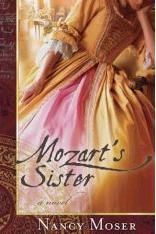
Title: Mozart's Sister
Author: Nancy Moser
Publisher: Bethany House, September 2006
Genre: Historical Fiction
ISBN: 0764201239
I got off the bench and offered the audience my best curtsy. But it was Papa’s eyes I sought. And there he was to the side with Mama and Wolfie. He was clapping too.
I’d gotten my chance to perform. Papa was proud of me. The world was good and right. I would hold onto this moment forever.
Of course she doesn’t. And that is the story of Maria Anna Mozart (Nannerl), Mozart’s older sister. It is the story of trying to earn a father’s attention and praise, of feeling both love and jealousy toward a brilliant little brother, and of being a talented musician yet thwarted from finding a future in the musical world because a woman would never be accepted there, dominated as it was by men.
The story unfolds chronologically (only the “Prelude”gives us a taste of the story’s ending) with Nannerl telling it in first person. The seventeen chapters are divided into five parts, each with a musical title, e.g. “Prelude,” “Overture,” “Interlude,” etc. The chapters themselves consist of a series of vignettes. These vignettes are usually short, tightly written, fast-paced with the characters in action and lots of dialogue.
Because this is also the story of Wolfgang Amadeus Mozart, the plot line won’t surprise some. However, what may surprise is the intimate view of life in the Mozart home. Nannerl’s confessional tone works well with the unflattering details revealed about her father, ‘Wolfie,’ even herself, and ring true as the voice of a conflicted girl.
Choosing to tell a story like this has its pitfalls. Nannerl could come off as excessively bitter and self-pitying, which Moser mostly avoids. Also we may be tempted to question whether Nannerl is a reliable narrator. Moser herself gives us some assurances of authenticity. “Because the Mozart’s were avid letter writers and, as per Papa’s instructions, most of the correspondence remains...I was able to use many of their actual words in the book, “ she writes in a “Dear Reader” section at the end of the book. However, she goes on to say that some pieces of the story were missing from primary documents. Thus the compelling story Moser tells and the believable characters she sustains even when blending fact with fiction is a credit to both her story telling skill and her ability to get inside the heads of characters.
While characters loom large in this book, the setting is not unimportant. The musical world of the 1760s-1790s, dominated as it was by court intrigue, snobbishness, class divisions and gossip, played a huge part in the Mozarts’ story. The fragility of life, with people constantly in danger of contracting and dying from small pox, rheumatic fever, dysentery, plague etc. was another big story element.
As mentioned above, themes of sibling rivalry, jealousy and making life choices dominate. The story takes place in a time when the Christian worldview was unchallenged and such is the lens through which these characters see life. However, Nannerl is shown as a woman with a personal faith, who believes in prayer and does her share of agonizing over why God has allowed her life to turn out the way it has.
If there was one thing that would make the book even better, it would be an edition which, when opened, would begin playing the music of the era to accompany the reading. But even without that, this book delivers an authentic and moving visit to another place and time.
**********
Thank you to Bethany House for giving me a copy of the book to review.
Filed in Book Reviews - Fiction

0 comments:
Post a Comment